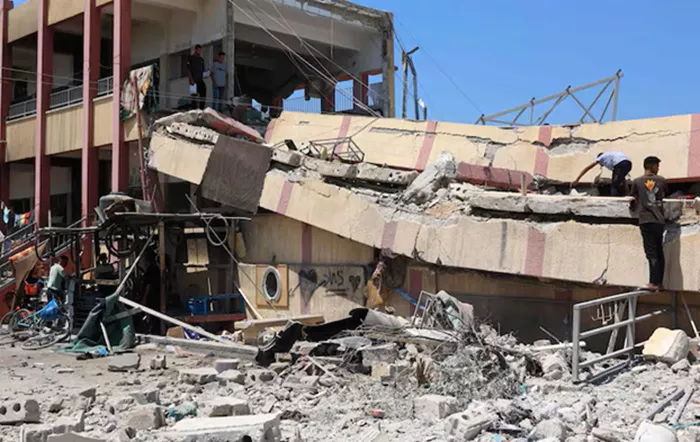After over ten months of Israeli bombardment, which has heavily damaged Gaza’s infrastructure, parents are anxious about whether their children will return to school for the new academic year.
The ongoing conflict has left approximately 630,000 students in Gaza without access to education. The violence has forced many families to flee their homes, leaving them struggling to find adequate shelter, food, and water. Schools have been repurposed as shelters and, in some cases, targeted during attacks aimed at militant groups.
According to the Palestinian Ministry of Education, which operates from the occupied West Bank, 186 schools in Gaza have been severely damaged or destroyed. Despite this, the Ministry announced plans to resume classes on September 9, using tents and online education to accommodate students.
However, a government spokesman in Gaza, Salama Marouf, stated that discussing educational plans is currently impractical due to the ongoing conflict. “There is no capacity to hold meetings or consult on details,” Marouf told The National.
The UN agency for Palestinian refugees (UNRWA), which manages schools in the region, has not yet set a date for the start of formal education. UNRWA spokeswoman Inas Hamdan mentioned that the agency began offering non-formal educational activities, such as entertainment, from August 1.
Parents like Rasha Yahya, 31, are deeply concerned about the war’s impact on their children. Yahya, who has a seven-year-old daughter, worries that the children have not only missed out on education but have also lost their sense of security and normalcy. “The children need a significant program, supported by the Ministry of Education and UNRWA, to help them regain some of their pre-war lives and reintegrate into education,” she said.
Yahya believes in-person learning is crucial for children, even if online options were available. She argues that face-to-face education is essential for improving behavior and correcting the negative effects of the war.
Mounes Youssef, 38, a father of five from Beit Lahia, emphasized the need for psychological support before resuming education. “The children need substantial mental and emotional preparation,” he said. Youssef lost his home and several relatives during the conflict. He expressed concern that returning to school without proper support could be detrimental to the children’s well-being.
Haneen Abu Zer, 28, who has been displaced to Al Zawaida in southern Gaza, supports the idea of restarting education for her two children. However, she feels they are not yet ready, having struggled to teach them basic skills herself. “I tried to teach my daughter to write and read, but she needs specialists,” Abu Zer said.
Abu Zer, originally from Gaza City, hopes the war will end soon so she can return to her home and restore normalcy. “We have lost everything, not just a school year. We must ensure our children are not left behind,” she said.


